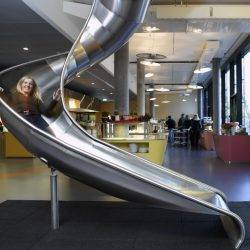August 17, 2017
How workplace design shapes and reflects organisational hierarchies
 The roots of the open plan office can be traced back to the 1960s when post-capitalism was beginning to emerge as a political and intellectual movement. The social and political upheaval that followed World War Two and the emphasis on the autonomous, motivated and engaged worker combined to inspire designers and architects to develop a new and more “modern” way of working. A mode of work characterised by an increased emphasis on social relations and flattened hierarchies. The open plan office was heralded as the ‘office of the future’; a progressive, transformative and near utopian design concept which would enable its occupants to thrive and succeed in a more socialist world. Yet the proponents of the open plan do not appear to have been fulfilled in large corporate businesses in the UK. I’d like to suggest that this failure is not a design fault but rather a problem caused by a clash of ideologies. Upon closer inspection, it appears that these larger corporations have not fully been able to shift into the social-democratic model of collaborative, open working styles.
The roots of the open plan office can be traced back to the 1960s when post-capitalism was beginning to emerge as a political and intellectual movement. The social and political upheaval that followed World War Two and the emphasis on the autonomous, motivated and engaged worker combined to inspire designers and architects to develop a new and more “modern” way of working. A mode of work characterised by an increased emphasis on social relations and flattened hierarchies. The open plan office was heralded as the ‘office of the future’; a progressive, transformative and near utopian design concept which would enable its occupants to thrive and succeed in a more socialist world. Yet the proponents of the open plan do not appear to have been fulfilled in large corporate businesses in the UK. I’d like to suggest that this failure is not a design fault but rather a problem caused by a clash of ideologies. Upon closer inspection, it appears that these larger corporations have not fully been able to shift into the social-democratic model of collaborative, open working styles.














 Poor health is one of the biggest factors causing people to leave work earlier than they would like to; yet poor health isn’t an inevitable part of ageing. We know that health conditions can become more likely as we get older. While some health conditions are not any more likely the older you get, others certainly are. Musculoskeletal conditions (affecting joints, bones and muscles) and heart and circulatory conditions increases significantly as we age. The fact that 14 percent of all 50-64 year olds have a musculoskeletal condition, and that musculoskeletal conditions alone account for 30 million days of sickness absence each year, is significant. People are by impacted by health conditions in different ways, and you can have a dramatically different outcome depending on how early you spot and take action to address a health issue at work. Sometimes slow-onset physical conditions such as musculoskeletal conditions, might start off mildly, but gradually lead to a painful exit from work. Because they change slowly they are more difficult to identify and there isn’t always a clear trigger point to do something about them.
Poor health is one of the biggest factors causing people to leave work earlier than they would like to; yet poor health isn’t an inevitable part of ageing. We know that health conditions can become more likely as we get older. While some health conditions are not any more likely the older you get, others certainly are. Musculoskeletal conditions (affecting joints, bones and muscles) and heart and circulatory conditions increases significantly as we age. The fact that 14 percent of all 50-64 year olds have a musculoskeletal condition, and that musculoskeletal conditions alone account for 30 million days of sickness absence each year, is significant. People are by impacted by health conditions in different ways, and you can have a dramatically different outcome depending on how early you spot and take action to address a health issue at work. Sometimes slow-onset physical conditions such as musculoskeletal conditions, might start off mildly, but gradually lead to a painful exit from work. Because they change slowly they are more difficult to identify and there isn’t always a clear trigger point to do something about them.




















August 23, 2017
I’ve got some real estate here in my bag
by Paul Carder • Comment, Flexible working, Property, Technology
We’ll marry our fortunes together.
I’ve got some real estate
Here in my bag.
So we bought a pack of cigarettes,
And Mrs. Wagner’s pies,
And walked off
To look for America.
“Kathy”, I said,
As we boarded a Greyhound in Pittsburgh,
Michigan seems like a dream to me now.
(more…)